Is Brown Sugar Really Better than White Sugar?

Alpa Momaya
August 11, 2023

Alpa Momaya
August 11, 2023
Sugar holds a captivating allure when it comes to our affinity for desserts and milkshakes. However, it is crucial to recognize that sugar is a detrimental option that adversely impacts our bodies in multiple ways.
The World Health Organization (WHO) conducted a survey in 2019, which revealed that diabetes claimed the lives of approximately 1.5 million individuals worldwide. This condition has evolved into a global factor contributing to various health issues. The unsettling truth about sugar lies in its ability to render the body susceptible to numerous diseases, including high blood pressure, obesity, and heart problems. Therefore, whether it’s brown sugar or white, excessive consumption of either variant can pose serious hazards to one’s well-being.
This article aims to delve into the production process of brown and white sugar, examine their nutritional value and characteristics, discuss their health benefits and risks, and explore potential alternatives. By doing so, it seeks to empower readers to make informed and healthier choices between the two. Thus, before delving further, let’s familiarize ourselves with the process of producing sugar.
The manufacturing process of white and brown sugar involves several steps. First, sugar cane or sugar beets are harvested and cleaned. The juice is then extracted and purified through filtration and heating. Lime is added to the juice to remove impurities, and carbon dioxide is bubbled through it to form calcium carbonate precipitates. The juice is further clarified and concentrated through evaporation. Crystallization is induced by seeding the concentrated juice with sugar crystals or using centrifugal force.
Furthermore, this resulting mixture of sugar crystals and molasses is then separated through spinning in centrifuges. For white sugar, the molasses is removed completely, while for brown sugar, some molasses is retained, giving it a distinctive flavor and color. The sugar crystals are dried, cooled, and packaged for distribution.
Both brown and white sugar have a similar calorie content. They contain approximately 16 calories per teaspoon (4 grams). However, brown sugar is slightly higher in calories due to its moisture content. The exact calorie content may vary depending on the brand and type of sugar, but the difference between brown and white sugar in terms of calories is generally negligible.
Brown and white sugar have similar nutritional profiles, primarily consisting of carbohydrates in the form of sucrose. Both types of sugar are low in essential nutrients and do not provide significant amounts of vitamins, minerals, or fiber. They are considered empty calorie sources, meaning they contribute calories without offering substantial nutritional benefits.
However, brown sugar contains slightly higher amounts of minerals like calcium, iron, and potassium compared to white sugar, primarily due to the presence of molasses. Nonetheless, the quantities of these minerals in brown sugar are generally insignificant and do not contribute significantly to overall nutrient intake. It’s important to note that consuming excessive amounts of either brown or white sugar can have negative health effects and should be limited.
Now that you know the nutritional content of both White sugar & Brown sugar and looking for a healthier alternative to these. Let us help you finger out a few substitutes for sugar that will preferably be great for your taste buds and your health. You can use stevia, coconut sugar, jaggery, honey and even maple syrup in your food and drinks.
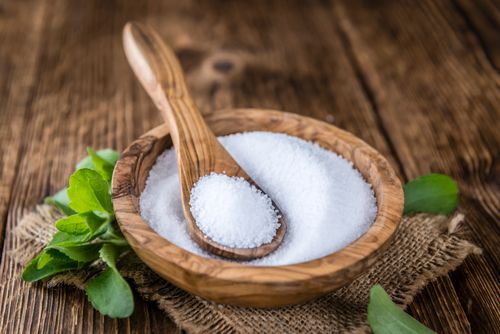
Stevia is a natural sweetener derived from the leaves of the Stevia rebaudiana plant. It offers several potential benefits, including being a calorie-free alternative to sugar, making it suitable for individuals watching their calorie intake. Stevia does not raise blood sugar levels and may be a suitable option for people with diabetes. Additionally, it has a high sweetness level, requiring smaller quantities compared to sugar. However, some people may find stevia’s taste slightly different or experience a bitter aftertaste. It contains virtually no calories, fat, protein, or carbohydrates.
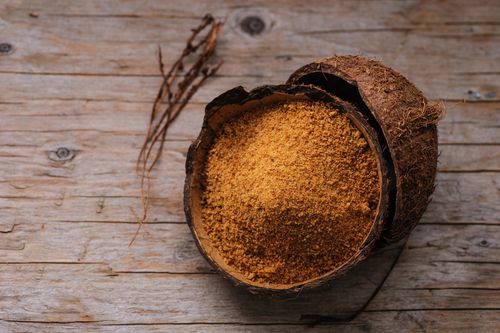
Both healthy and a popular choice among vegans, coconut sugar is a great substitute for sugar. Produced from the sap of coconut palm tree and thus undergoes minimal refining. So, it is organically extracted and then made into a syrup and eventually dried. Unlike Brown Sugar, which has little nutritional value, coconut sugar retains many nutrients like calcium, iron, zinc and potassium.
A teaspoon contains 18 calories, 5 grams of carbohydrate and 5 grams of sugar. It also consists of inulin, a soluble fibre that helps to control post-meal blood sugar spikes.
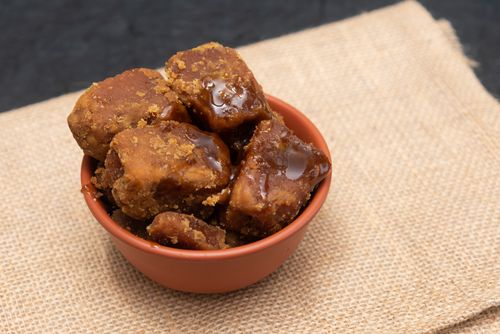
Jaggery, a traditional unrefined sweetener made from sugarcane juice or palm sap, offers several potential benefits. It is rich in iron, making it beneficial for those with iron deficiency or anemia. Jaggery also contains antioxidants and minerals like potassium, calcium, and magnesium. It is known to aid digestion, boost immunity, and provide a sustained release of energy. However, jaggery should still be consumed in moderation due to its high calorie content and potential impact on blood sugar levels, especially for individuals with diabetes or those aiming to manage their weight.
It is a great source of iron, calcium, magnesium, phosphorus, and potassium. Jaggery or Gur is also an excellent source of antioxidants that helps in reducing oxidative stress. 1 tsp of jaggery consists of 15 calories, 4g of carbohydrates. Nevertheless, you still need to restrain yourself from consuming more than required.
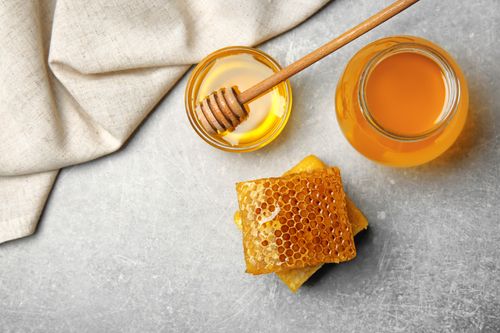
Though some may argue that honey is higher in calories than sugar, as per tablespoon contains 64 calories, 17 grams of carbohydrates and 17 grams of sugar.
It is also true that honey has other nutritional benefits that your normal white sugar doesn’t. Honey possesses anti-microbial and anti-inflammatory properties. It also has traces of iron, zinc and potassium. It also tastes sweeter than sugar, so to balance out, you may need less if you’re using it as a substitute.
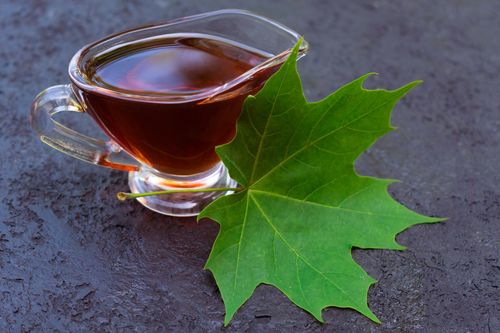
Maple syrup is a sweetener, originating in Canada, extracted from the sap of the maple tree and considered extra sweet. Some also praise the nutritional value of maple syrup, even if it is a high-calorie food.
A tablespoon of maple syrup contains 52 calories, 13 grams of carbohydrate and 12 grams of sugar. Moreover, it is also rich in manganese that is essential for healthy bones and other nutrients like iron, copper, zinc, calcium and potassium. Recent research also has found that Maple syrup is great to lower cholesterol levels and help in preventing Alzheimer.
Looking for healthier sugar alternatives? Consider stevia, a calorie-free sweetener suitable for diabetics, and coconut sugar, which retains nutrients like calcium and potassium. Jaggery, made from sugarcane or palm sap, is rich in iron and antioxidants. Honey has antimicrobial properties and contains trace minerals. Maple syrup, although high in calories, is rich in manganese and may help lower cholesterol. Remember to consume these substitutes in moderation and adjust quantities to maintain a balanced diet.
Brown or white sugar – Eating sugar can be done in moderation. That’s the key as most of us love sweet foods and drinks. The problem arises when we eat too much sugar. A teaspoon of sugar will not harm you drastically. It’s only when we go overboard in our daily consumption of sugar. Also know about the hidden sugars in processed foods. Learn to identify sugar on the product food labels. They can be listed as sucrose (table sugar), corn sweetener, high-fructose corn syrup, and fruit-juice concentrates. Other names are nectars, raw sugar, malt syrup, maple syrup, fructose sweeteners, liquid fructose, honey, molasses, or anhydrous dextrose. Stay away from these to follow a healthy lifestyle.
Since Brown and White sugar hardly make any difference in adding any nutritional value to your diet, you can choose a healthier substitute for these. Sugar is equally important to provide you with energy in the form of glucose. However, we sometimes inadvertently consume visible sugar in our teas/ coffees or invisible sugar in processed or baked foods or fizzy drinks. Also, make sure you limit your sugar intake and over the due course, make smart swaps to the healthier alternatives for overall health benefits.
To answer the question, is brown sugar really better than white sugar? No, it isn’t.
Disclaimer: The purpose of this article is just to disperse knowledge and raise awareness. It does not intend to replace medical advice from professionals. For further information please contact our certified nutritionists Here
Though brown sugar has some minerals like calcium, potassium, iron and magnesium, these minerals do not omit the risk of illness and diseases that are caused by brown sugar. Nutritionists and dieticians never advise to include visible sugar, whether white or brown, into daily meals. So, you can limit its consumption to 1-2 tsp per day along with your favourite tea or coffee. Nevertheless, if you just have it for enhancing the taste, you can opt for other healthier alternatives.
No, it can’t be said that it is bad for health. However, you must limit its intake in daily life.
Though Brown sugar has a lesser calorie content, it cannot be said that brown sugar is healthier than white sugar.
The nutrient profile of brown and white sugar is somewhat similar. So, a diabetic person is not advised to have brown sugar regularly. They can add healthier alternative like stevia in their favourite desserts and drinks.
Both brown and white sugar are similar in terms of calories. However, there are alternatives that can be an excellent choice if you are looking to cut down on sugar. Stevia, jaggery, honey or maple syrup are great options and aids weight loss.
Brown sugars boost metabolism, increase energy and are great for relieving menstruation cramps.

